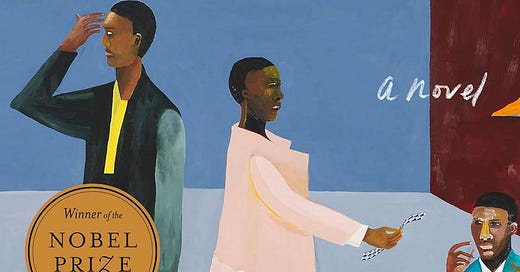Theft, by Abdulrazak Gurnah
I first came across Abdulrazak Gurnah’s name a few years ago when I read a review of his novel Afterlives. Gurnah had been awarded the Nobel Prize in Literature the year before; the review sparked interest, so I picked up Afterlives and one of his best-regarded earlier novels, By the Sea.
Gurnah grew up in Tanzania, a former British colony in East Africa. He has a reputation as a novelist whose work examines the legacy of colonialism. This is completely misleading if you imagine him to be didactic, a moralistic lecturer on the evils of the West. But it is true in the sense that all his characters grew up in an environment where they were ruled by people from a foreign land, or had recently emerged from that rule. The settings of the stories I’ve read stretch from Tanzania’s roots as a German colony at the beginning of the twentieth century, through the struggle between Germany and Britain for control during the First World War (Afterlives), through independence in the early 1960s (By the Sea), and into the present (Theft, which was just published this year).
Gurnah’s novels, like all literature, are about people: the events, circumstances, and relationships that rejoice us and afflict us; the things we celebrate, the things we endure, and the things we strive for – both worthy and unworthy strivings.
One of my tests for great fiction is whether I care about the characters and what will happen to them as the story unfolds. As I read Theft this past week, I was carried along by the story, eager to see what would happen to Badar and Fauzia and Karim and Raya and Haji. The story proceeds indirectly; you don’t know where it is going or who it will center on until the very end. Gurnah’s writing is measured and understated; he has the gift of showing you a fully realized picture without having to explain it.
Theft is a good place to start with Gurnah, and it’s in bookstores now.
- Jack Jr.
Books From Friends
Over the last month I’ve been thrilled to see two friends and fellow Seacoasters release books. They are both people I have enormous respect for, and now I also own things they’ve written. Nick Johnston is the CFO at Seacoast Church and his book, Eavesdropping on Heaven, comprehensively (as if Nick could do it any other way) examines how the Bible talks about the end times. I’ve really enjoyed reading his perspective and appreciate the meticulous way he reads and studies.
I’ve been listening to Tara Banks lead worship at Seacoast for a long time and being able to work with her in my role will always be one of the highlights of my time at the church. Getting to be her friend is the best thing, though, because in part that means I get to talk with her about the great stuff she’s working on. Her new book on the fruit of the Spirit called Finding Everyday Fruit comes out tomorrow and you should definitely check it out.
If you’re local, you can find both books in the Seacoast Church bookstore in Mount Pleasant. But you can also use the links I added above and grab them online.
- Jack III






Thank you so much, I think I'll start with "Theft". I enjoyed this weeks messages and look forward to more "good stuff' next week. Have a lovely weekend. hugs